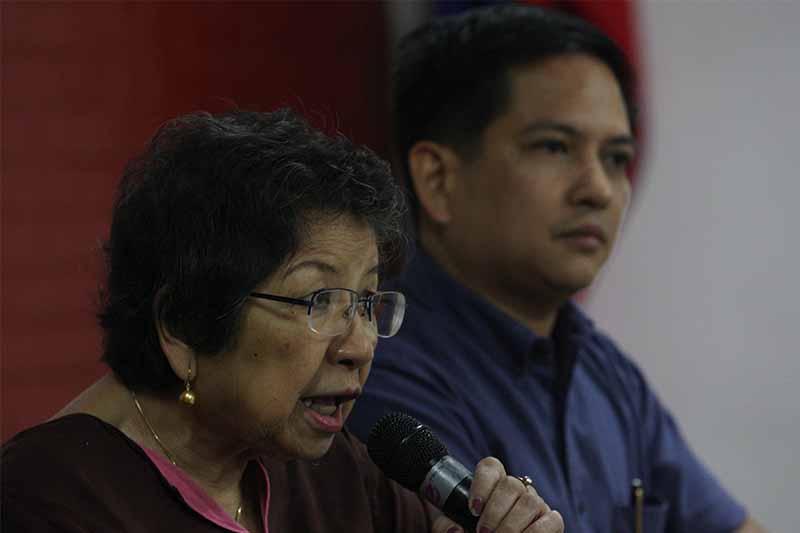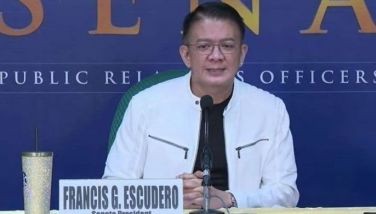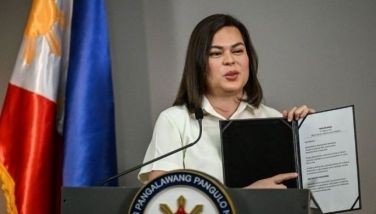More than a decade of campaigns down the drain if Philippines exits ICC
March 15, 2018 | 5:25pm

Etta Rosales, former chairperson of the Philippine Coalition for the International Criminal Court, together with current chair Ray Paolo J. Santiago gives a statement at the Commission on Human Rights Office Thursday, March 15, 2018, following the announced withdrawal of the Philippine ratification of the Rome Statute. They said the withdrawal does not save President Duterte from accountability as the withdrawal does not take effect immediately. The STAR/Michael Varcas
MANILA, Philippines — A group that pushed for ratification of the Rome Statute of the International Criminal Court urged the Philippine government on Thursday to reconsider withdrawing from a treaty that they campaigned more than a decade for.
"We are appalled with the declaration of President Rodrigo Roa Duterte for the Philippines to withdraw from being a state-party to the Rome Statute on the International Criminal Court," Ray Paolo Santiago, Philippine Coalition for the International Criminal Court chair, said in a statement.
"They have been campaigning for its ratification since 1998, when Erap (Joseph Estrada) was the president," Etta Rosales, former PCICC chair and former head of the Commission on Human Rights, said.
"They lobbied with him and he signed the Rome Statute in 2000. Then the campaign continued until PNoy (Benigno Aquino III) signed and ratified it with Senate concurrence with [Sen. Franklin] Drilon as senate president and Miriam [Defensor-Santiago] as principal champion," she also said.
"Sadly, this move is anti-people,” he added, as his group challenged the president to think of the Filipino people and stop thinking of himself," PCICC chair Santiago said.
Duterte, who announced the Philippines' intention to withdraw its ratification of the Rome Statute, cited "the baseless, unprecedented and outrageous attacks on my person as well as against my administration, engineered by officials of the United Nations as well as an attempt by the International Criminal Court special prosecutor to place my person within the jurisdiction of the International Criminal Court."
He also cited, inaccurately, that failure to publish the treaty in the Official Gazette nullified ratification of the Rome Statute as well as the concurrence to it by the Senate in 2011.
PCICC, incidentally, used to count presidential spokesperson Harry Roque as a conevener and member.
The presidential mouthpiece, whom human rights defenders have said has turned his back on his former principles, said Philippine withdrawal would be the "beginning of the end" as other countries might follow suit.
Tindig Pilipinas notes Duterte's 'alternative bravery'
Tindig Pilipinas, a cause-oriented group critical of the Duterte administration and which counts members of the political opposition in its ranks, meanwhile mocked the president for his decision, which it said shows that for all the president's braggadocio, he is afraid of the ICC.
The group labeled the president's stance as "alternative bravery," a reference to "alternative facts", a phrase used to mock US President Donald Trump.
Tindig Pilipinas also scoffed at suggestions that Duterte's decision was a sign of his independent foreign policy as he had "kowtowed to his Chinese masters" on matters related to the West Philippine Sea.
The group said that the withdrawal is a sign of Duterte's "supreme cowardice" and of the realization that they would now be made accountable for the killings attributed to his war on drugs before an international tribunal.
"That he withdrew from the ICC is illustrative of the growing desperation of how hard he tries to extricate himself from the human rights abuses he so proudly professed and now so cowardly distances [from]," the group said.
Duterte had initially scoffed at the ICC and insulted Fatou Bensouda at bragged that the international court would never have jurisdiction over him.
Bensouda's office had announced a preliminary examination meant partly to determine if the ICC has jurisdiction over the allegations against Duterte and his officials. It had not made a decision either way prior to Duterte's announcement on Wednesday.
The announcement of the intention to withdraw came little more than aa month after the prosecutor of the International Criminal Court announced that a preliminary examination into abuses, including extrajudicial killings, allegedly attending Duterte's crackdown on illegal drugs was underway.
Duterte, in justifying his decision, said that the international community, including United Nations officials, was biased against him and would like to paint him as a heartless human rights violator.
Duterte's decision was enthusiastically supported by his allies.
BrandSpace Articles
<
>
- Latest
- Trending
Trending
Latest
Trending
Latest
Recommended




























